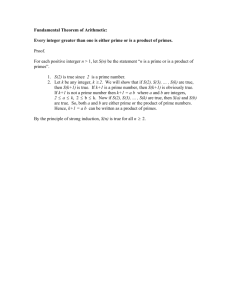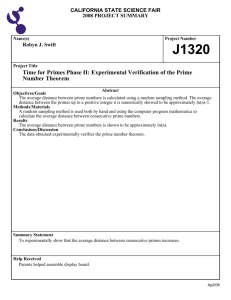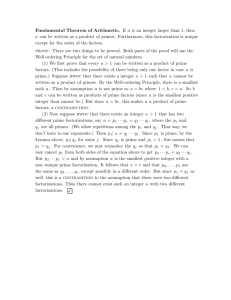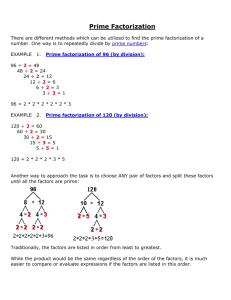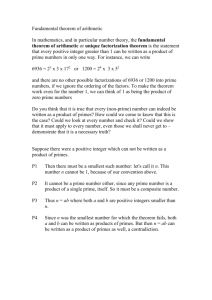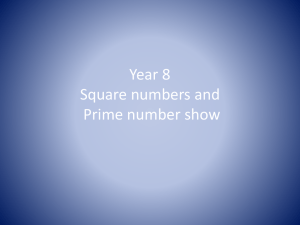MATH 57091 - Algebra for High School Teachers Fundamental
advertisement
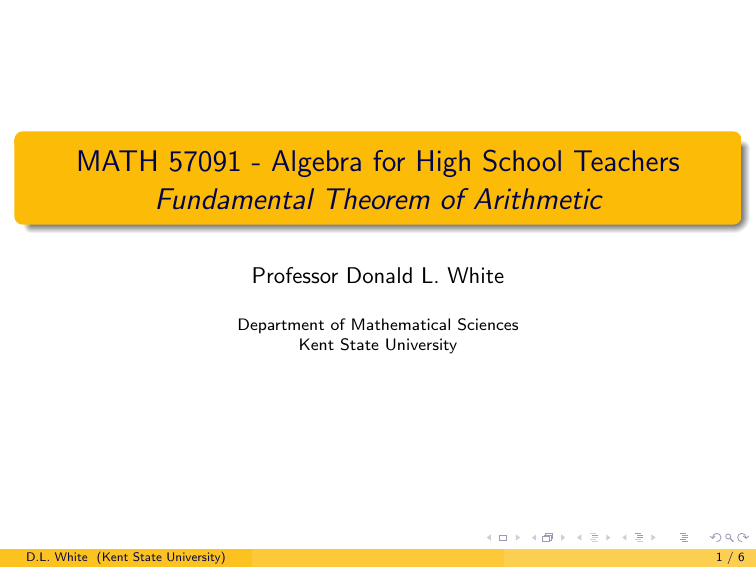
MATH 57091 - Algebra for High School Teachers Fundamental Theorem of Arithmetic Professor Donald L. White Department of Mathematical Sciences Kent State University D.L. White (Kent State University) 1/6 Statement of Theorem Fundamental Theorem of Arithmetic Every integer n > 1 is either prime or a product of primes. The expression of n as a product of primes is unique, except for the order of the factors. If we specify the order of the prime factors, we get a unique factorization: Corollary Every integer n > 1 can be written uniquely in the form n = p1a1 p2a2 · · · prar , where p1 < p2 < · · · < pr are primes and ai > 1 is an integer for each i. This unique expression is the Canonical Prime Factorization of n. Example: The canonical prime factorization of 720 is 720 = 24 · 32 · 51 = 24 · 32 · 5. 2 4 It is not 3 · 2 · 5 or 24 · 32 · 5 · 70 . D.L. White (Kent State University) 2/6 Prime Factorization for Comparison In the canonical prime factorization, we do not allow exponents to be 0. Otherwise we could include p 0 as a factor for any prime p. It will be useful for discussing divisibility in terms of prime factorizations to allow exponents to be 0 in certain situations, however. We have the following slight modification of the canonical factorization: Prime Factorization for Comparison Let a and b be positive integers. Let p1 < p2 < · · · < pr be all primes that divide at least one of a or b. The integers a, b can be expressed uniquely in the form a = p1a1 p2a2 · · · prar b = p1b1 p2b2 · · · prbr where ai > 0 and bi > 0 are integers for all i. Example: If a = 22 · 35 · 73 · 11 · 135 and b = 25 · 3 · 52 · 113 , then a = 22 · 35 · 50 · 73 · 11 · 135 b = 25 · 3 · 52 · 70 · 113 · 130 . D.L. White (Kent State University) 3/6 Sketch of Proof We now sketch a proof of the Fundamental Theorem of Arithmetic. Existence: Suppose there exists an integer greater than 1 that is neither a prime number nor a product of primes. By the Well-ordering Principle, there is a smallest such integer; call it n. Since n is not prime, there are integers a and b such that n = ab, 1 < a < n, and 1 < b < n. Thus by the minimality of n, a is prime or a product of primes and b is prime or a product of primes. Hence n = ab is a product of primes in any case, a contradiction. Therefore, no such integer n exists, and so every integer greater than 1 is a prime or a product of primes. D.L. White (Kent State University) 4/6 Sketch of Proof Uniqueness: Suppose n = p1 p2 · · · pr and n = q1 q2 · · · qs , where each pi and qj is prime. We have p1 p2 · · · pr = q1 q2 · · · qs . Dividing both sides by each prime that appears in both factorizations, we end with either 1 = 1, so r = s and (after possible rearrangement) pi = qi for each i, or 0 , where p 0 6= q 0 for all i and j. p10 p20 · · · p`0 = q10 q20 · · · qm i j In the first case, the prime factorization of n is unique (except for order). 0 , In the second case, p10 | q10 q20 · · · qm and so by Euclid’s Lemma for Primes, p10 | qj0 for some j. But qj0 is prime, so the only positive factors of qj0 are 1 and qj0 . Since p10 6= 1, we must have p10 = qj0 , a contradiction. Therefore, the second case does not occur. D.L. White (Kent State University) 5/6 Another Return to Square Roots Theorem If p is a prime number, then √ p is an irrational number. √ Proof: Suppose to the contrary that p is rational. √ We can then write p = ba , where a and b are integers. √ We then have a = b p, and so a2 = pb 2 . Observe that if an integer n has canonical prime factorization n = p1a1 p2a2 · · · prar , then n2 = (p1a1 p2a2 · · · prar )2 = p12a1 p22a2 · · · pr2ar . Hence the number of prime factors in the factorization of n2 is 2a1 + 2a2 + · · · + 2an = 2(a1 + a2 + · · · + an ), and so is even. Therefore, the number of prime factors of a2 is even, while the number of prime factors of pb 2 is odd. Since a2 = pb 2 , this contradicts the uniqueness of prime factorization. √ Hence no such fraction ba exists, and so p is irrational. D.L. White (Kent State University) 6/6


